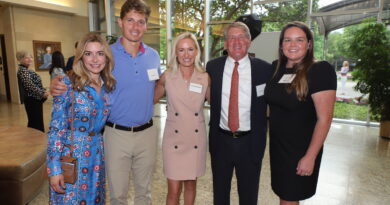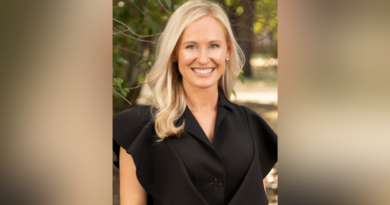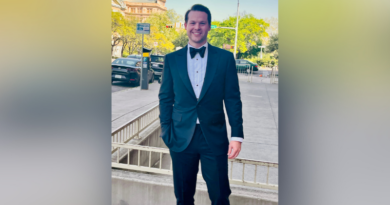Joseph Kim – 20 Under 40
George W. Bush Institute
33 | Education: Bard College
Joseph Kim was one of the first North Korean minor refugees to come to the U.S. under the 2004 North Korean Human Rights Act, which became law during President George W. Bush’s tenure.
Kim calls Bush, whom he’s known for a decade, his biggest inspiration.
“Given that I work at the George W. Bush Institute, you may think this is a political answer, but it is not,” Kim said. “President Bush helped me realize that humility and confidence are not separate entities but two sides of the same coin.”
“He is my personal hero and role model because I want to become a genuine and compassionate person like he is, and he has an excellent sense of humor,” Kim added.
Kim became a homeless orphan at the age of 12. His father died of starvation, and Kim was separated from his mother and sister.
Now, he works as program manager of global policy at the Bush Institute, which he describes as “an excellent platform to pursue my passion for helping the North Korean people.”
“At the Bush Institute, we work to advance policies that integrate human rights with national security, provide scholarships to North Korean refugees to study in America, and develop a new generation of human rights advocates,” he said.
Through his job, he speaks at various forums and events to raise human rights and security concerns.
Studying history was a big part of why he chose his career.
“Judging history or bad actors or characters in history is easy, but the purpose of learning history should not be about judging those bad actors,” Kim said. “Instead, ask yourself how you would choose your course of action differently and prepare yourself to form a better version of yourself.”
What was your first job, and what did you learn from it?
My first job in the United States was cleaning tables at a local restaurant. That night, I made $20 and some change. I wanted to keep the $20 bill for life, so I saved it in a safe space. Unfortunately, it’s so safe that I can’t remember where I hid it. I learned that if you want to hide something, remember where you put it.
Where do you see yourself and/or your career 10 years from now?
I hope by then, North Korea will be freed from dictatorship, and (I’ll) be able to return to my hometown. I want to become a high school teacher and care for orphans in free North Korea.
What is your favorite local restaurant or shop?
Gloria’s Latin Cuisine.
What’s on your bucket list?
It is a long shot, but making a final table in a poker tournament would be cool.
Who’s your biggest inspiration and why?
My biggest inspiration is President George W. Bush. Given that I work at the George W. Bush Institute, you may think this is a political answer, but it is not. I became a homeless orphan when I was 12 and survived a hellish circumstance, and I have a decent judgment of a person, without which I would not have survived. I have had the honor and privilege to get to know President Bush for a decade. Based on my judgment, combined with rationality and instinct, I know he’s a caring and genuine person. President Bush helped me realize that humility and confidence are not separate entities but two sides of the same coin. He is my personal hero and role model because I want to become a genuine and compassionate person like he is, and he has an excellent sense of humor that I would be lucky to develop.
What was your “lightbulb moment” that led you to your career?
For me, it was more of a gradual buildup than a particular moment. Studying history was a big part of why I chose my current career. Judging history or bad actors or characters in history is easy, but the purpose of learning history should not be about judging those bad actors; instead, ask yourself how you would choose your course of action differently and prepare yourself to form a better version of yourself.
How do you motivate yourself and others?
Being surrounded by good people and hopefully emulating that goodness motivates others.
What’s a fun fact that someone wouldn’t know about you?
Perhaps it is not a fun fact, but a fact, nonetheless. I was one of the first North Korean minor refugees to come to the United States under the 2004 North Korean Human Rights Act, which became a U.S. law under President George W. Bush’s tenure.
What would you tell an 18-year-old you?
“You are so young; you stand before beginnings… have patience with everything that remains unsolved in your heart. Try to love the questions themselves, like locked rooms and like books written in a foreign language. Do not now look for the answers. They cannot now be given to you because you could not live them. It is a question of experiencing everything. At present you need to live the question. Perhaps you will gradually, without even noticing it, find yourself experiencing the answer, some distant day. Perhaps you are indeed carrying within yourself the potential to visualize, to design, and to create for yourself an utterly satisfying, joyful, and pure lifestyle. Discipline yourself to attain it, but accept that which comes to you with deep trust, and as long as it comes from your own will, from your own inner need, accept it, and do not hate anything.” – Rainer Maria Rilke, Letters to a Young Poet.
What advice do you have for other young professionals?
When in doubt, listen to your inner voice and trust yourself.
Is there anything else you think we should know about you?
I can eat the same food(dish) for lunch and dinner five days a week.









